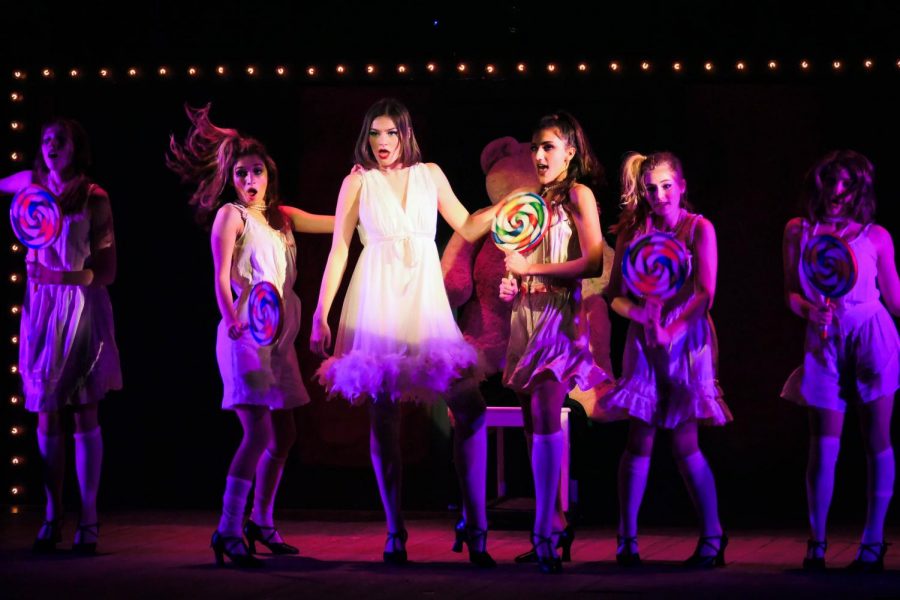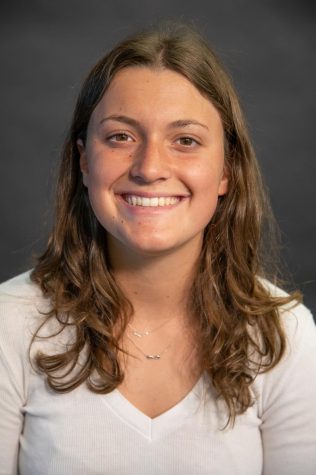In Photos: Menlo Drama’s ‘Cabaret’
Sally Bowles, played by senior Emma Dressel, sings “Don’t Tell Mama” with the Kit Kat Klub girls. Staff Photo: Bella Guel.
November 8, 2019
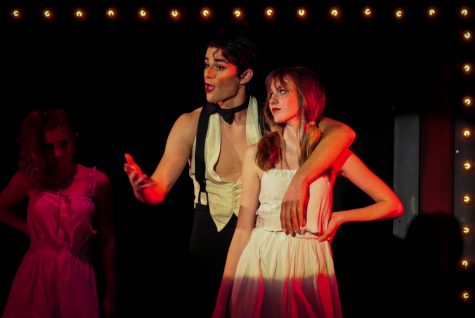
Kit Kat girl Helga, played by junior Langley Ward, is introduced to the audience by the Emcee, Declan Stanton, as the baby of the performers. Langley has been performing in the Menlo drama department since her freshman year, and this is her fourth show so far. When asked about her experience playing a Kit Kat girl, Ward stated that “it was fun to see people’s reactions” as was acting as “someone she was the exact opposite of.” On the other hand, this was Stanton’s first performance with the Menlo drama department. Staff Photo: Bella Guel.
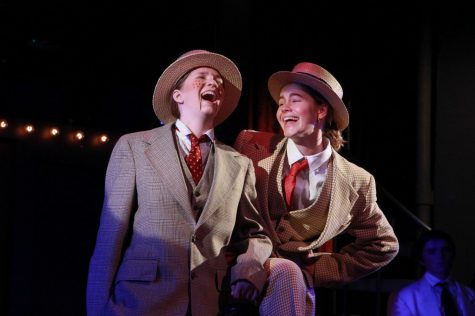
The Uber sisters, played by Laura and Sophia Artandi, make a joke in German about the Nazi Party. According to Sophia Artandi, the pair were discussing “how Germans tie their shoes in little Nazis.” This is both Laura and Sophia’s first show at Menlo. Staff Photo: Sadie Stinson.
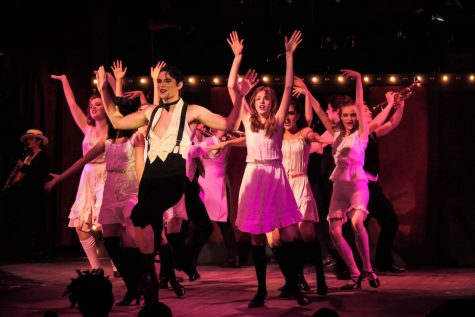
The Emcee and the Kit Kat girls perform the opening number “Willkommen.” The performance sets a tone for the Kit Kat Klub and establishes the light hearted, “wonderful” spirit of the night-life in Berlin that the Emcee speaks of. Staff Photo: Bella Guel.
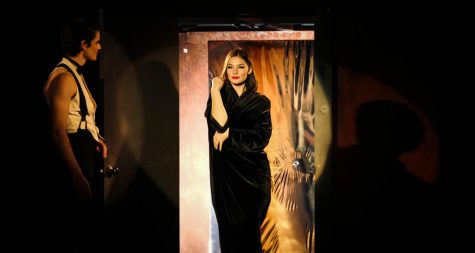
Sally Bowles, played by senior Emma Dressel, is revealed to the audience in a dramatic entrance queuing the beginning of her first number, “Don’t Tell Mama.” The song presents Sally to the audience for the first time and establishes her headlining role at the Kit Kat Klub. Staff Photo: Bella Guel.
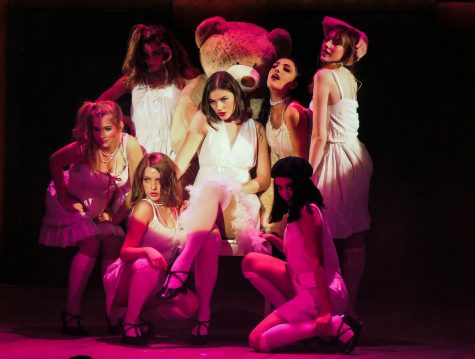
Sally Bowles is surrounded by her fellow Kit Kat Klub girls at the closing of “Don’t Tell Mama.” Ms. Bowles’ fellow entertainers include Rosie, Texas, Frenchie, Helga, Fritzieand Lulu, played by juniors Mack Ford, Annabelle Marenghi, Allie Lev, Langley Ward, senior Elizabeth Vaynblat and sophomore Uma Misha respectively. According to Lev, playing a Kit Kat girl was not only “so fun,” but also a “challenge.” Staff Photo: Bella Guel.
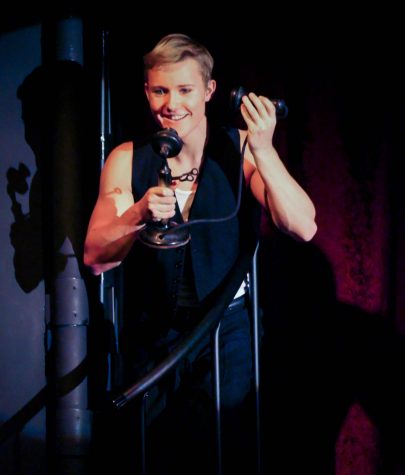
Kit Kat boy, Bobby, played by senior Griffin Thomas, calls his former American lover Clifford Bradshaw who has recently been spotted in Berlin about reconnecting. Thomas has been performing in Menlo drama productions since the sixth grade and was excited to be a part of the Cabaret cast. According to Thomas, “the show broke a lot of barriers” as “having a same-sex kiss” between his character and Cliff is “a jump for a high school show, but necessary to not misconstrue the message of the musical.” Staff Photo: Bella Guel.
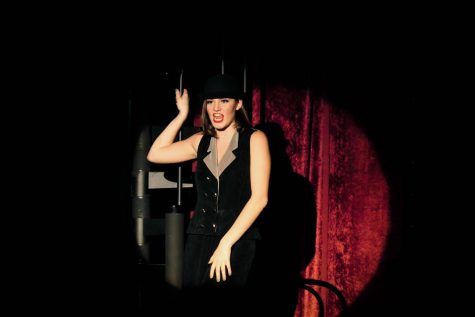
Sally Bowles performs “Mein Herr” after being fired from the Kit Kat Klub, kicked out on the street, and ultimately left broke and homeless in a foreign country. Dressel describes this scene as Sally’s “pissed off number” as she is not only fired up on anger, but also determined to pick herself up after such a drastic change. Staff Photo: Bella Guel.
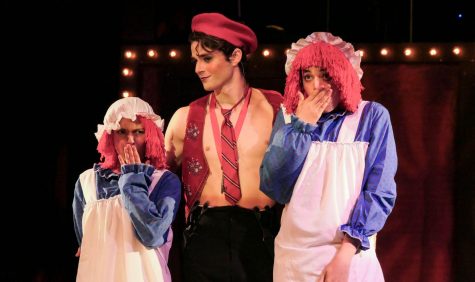
The Emcee performs “Two Ladies” with Elizabeth Vaynblat and Jack Rosenberg dressed in rag-doll reminiscent costumes. According to Dressel, it is supposed to be a “fun number” that exemplifies the party culture of Berlin as the Emcee sings about the sex life of these roommates. Staff Photo: Bella Guel.
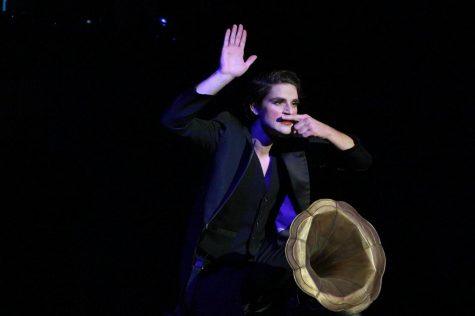
The Emcee salutes Hitler as he listens to a little boy sing “Tomorrow Belongs to Me,” the anthem of the Nazi’s in the production. The song is later reprised by Fraulein Kost, Ernst, and other guests at Schutlz and Schnider’s engagement party. Although the song may seem harmless at first, it soon turns very sinister and disturbing when sung by all of the guests at the engagement party. Staff photo: Sadie Stinson.
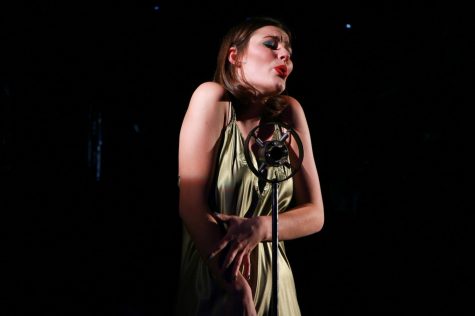
Sally Bowles sings “Maybe this time,” a song about finding love and happiness against all odds. Dressel is a key player in the Menlo Drama department, and has had featured roles in several other productions including “Heathers” and “The Old Man and the Moon.” Staff photo: Sadie Stinson.
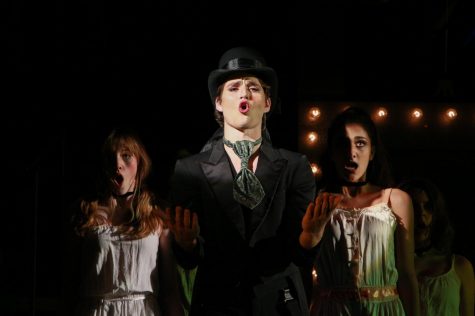
In the song “Money, Money” the Emcee expresses to the audience the intense love of money, and the extreme lengths that people will go to in order to obtain it. The song comes after Cliff makes a dubious moral decision to pick up an unknown briefcase for Ernst Ludwig in exchange for 75 marks. The choice that Cliff makes alludes to the Emcee singing about how “money makes the world go round.” Staff photo: Sadie Stinson.
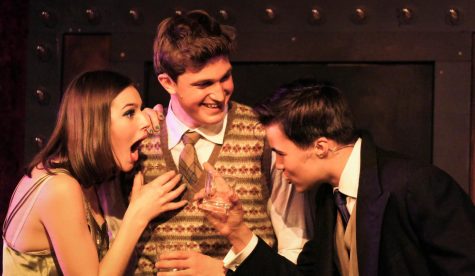
Clifford Bradshaw, played by sophomore Trent Conley, accepts a well-paying job from Ernst Ludwig, played by junior Leo Jergovic. Little does Cliff know the job supports the Nazi regime that he so desperately disapproves of. Staff Photo: Bella Guel.
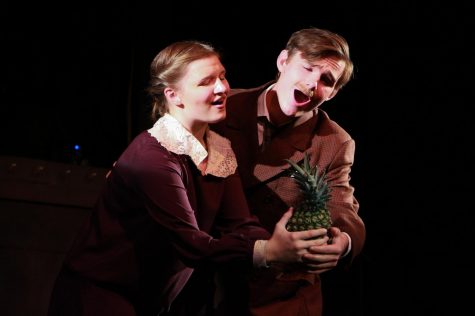
Fraulien Schneider and Herr Schultz, played by Amy Wyatt and Ethan Bernheim respectively, sing “It Couldn’t Please Me More,” a song where Schnieder expresses her love and delight when Schultz brings her a pineapple from his fruit shop. Wyatt describes the song as “one of her more vulnerable moments–Herr Shultz brings her so much joy and hope in moments like these, and that’s why it hurts her so much later on when she realizes that she can’t marry him.” This is Wyatt’s tenth show at Menlo and Bernheim’s eighteenth. Staff Photo: Sadie Stinson.
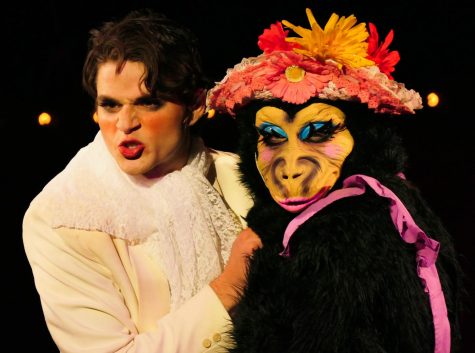
The Emcee sings “If You Could See Her Through My Eyes” as he dances with a gorilla. The song is a commentary on the general culture and mindset of the Nazi party as there is a heavy judgement on the ethnic and religious identity of individuals. According to Dressel, the song really calls viewers to simply “see people as people” rather than a label. Staff Photo: Bella Guel.
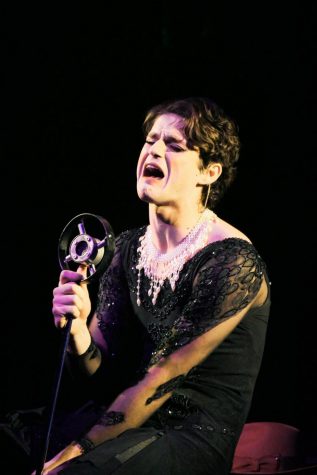
Dressed in an extravagant pearl necklace and black lace dress, the Emcee sings “I Don’t Care Much” on the edge of stage right. Midway through the second scene, the song is delivered to identify the complete mood shift from the Emcee. When first introduced to the Emcee he is exclaiming how “wonderful” Berlin is, but in this number, he is proclaiming the horrors of the societal norms. According to Dressel, “probably the scariest and most moving part of the song is the Emcee’s indifference to everything around him.” The song is not made to express the expected rage or fear of a bystander in Berlin, but rather a complete lack of emotion. Staff Photo: Bella Guel.
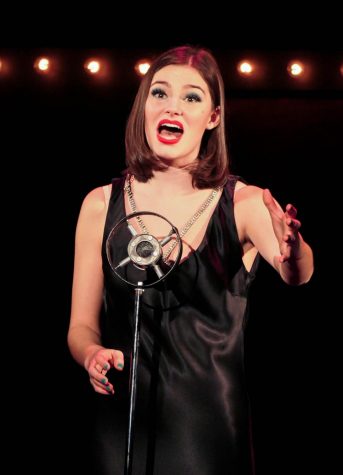
Sally Bowles performs her final song of the show titled “Cabaret” directly after telling her lover Clifford that she no longer is bearing their child. According to Dressel, the song was about standing at a crossroads between living in ignorance or in reality. Dressel also states that “Sally [would] rather die than be burdened by caring,” so she decides to continue living life like a never-ending party. Staff Photo: Bella Guel.
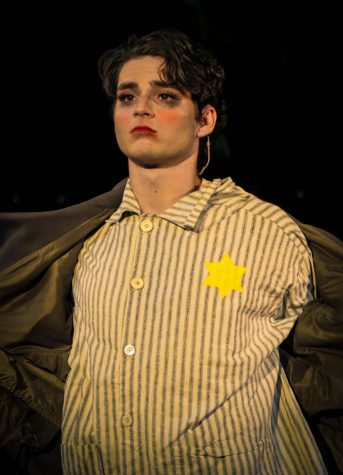
In the finale, the Emcee removes his overcoat to reveal a striped button-up with a Jewish star, as he turns to walk into a gas chamber. During the scene, a mirror is lowered and reflects the audience as the once upbeat Emcee has lost all his spark. Thomas explains that Director Steven Minning was using the mirror to symbolize a call to action as “we [the audience] can not stand idle to hate and genocide.” Thomas elaborates saying the mirror “was supposed to represent how the audience was compliant in the rise of Naziism.” Therefore, having the mirror reflect the audience would force individuals to feel the blame and responsibility for the death of the Emcee that had been guiding them through the production. Staff Photo: Bella Guel.


